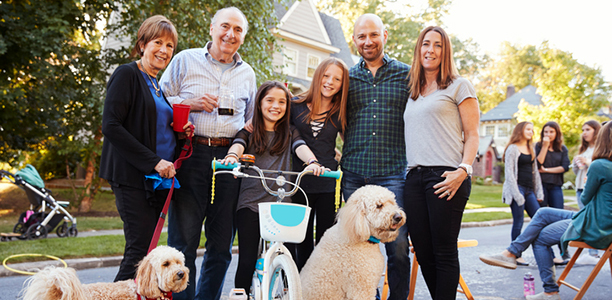Two deeply personal stories set the tone at the event to launch The Kidman Centre UTS, formerly known as the UTS Health Psychology Unit, founded in 1985 by Professor Antony Kidman.
One was a poignant speech by 19-year-old Lucia Hawley, Kidman’s eldest granddaughter, who spoke of the trauma of losing her beloved “Papa” in 2014, followed only eight months later by the “excruciating” loss of her father.
The other was the revealing account by David* whose family was traumatised by years of conflict with their older son, now aged 12. The family participated in the Side by Side program with a UTS psychologist who helped them find solutions that allowed their son to feel his opinions mattered, that he was an equal.
Hawley was joined at the event by three generations of the Kidman family and told guests that saying goodbye to two highly influential men in her life shattered her world. “At 16 years old, processing these events was tough,” she said.
“However, despite what happened to me, I feel I am fortunate. Life goes on … I attribute this capacity to get up and face each day as best I could to my extraordinary Papa. I was sad and I grieved but my life stayed on track.”
David explained that while “life isn’t perfect, and there is still the occasional blow-up”, a family that was on the brink of collapse has been transformed into “a generally happy and well-functioning unit”.
Former prime minister Julia Gillard, now chair of mental health organisation Beyondblue, delivered the keynote address and said Professor Kidman’s pioneering work in clinical psychology was evident in “so much of what we know and do in Australia to educate the public about managing mental health”.
“Professor Kidman was also an early leader in recognising that early intervention, especially for adolescents, would make the most powerful difference to the rest of their lives,” she said.
His vision was that no child should fall through the cracks on matters of mental health, Gillard said; the best advice should be available to all children, everywhere.
Clinical psychologist Dr Rachael Murrihy worked with Kidman for almost a decade and, as the centre’s director, will oversee its move to Prince of Wales Hospital, Randwick.
Murrihy paid tribute to a large and loyal cohort of supporters who help the centre to deliver its three key services:
- Preventive mental health talks at schools for students, parents and teachers – at a typical HSC talk of 100 students, two in three will indicate they are moderately to severely stressed
- Mental health training initiatives with young people, the mental health sector and schools – the Thrive project, which will launch in coming months, will train staff to support children with behavioural problems at 192 primary schools in regional and rural NSW
- A tandem approach of treatment and research such as the Side by Side clinics, which have helped 120 families over four years. The goal is to expand the clinics’ reach, especially to western Sydney where the need is greatest.
“Challenging behaviours in children are the most reliable indicator we have that an individual will go on to develop major psychiatric disorders in adulthood, including depression, anxiety and substance abuse,” Murrihy said.
“Through our treatment of hundreds and children and their families, we know that addressing issues early prevents the development of more complex problems down the track.”
UTS Vice-Chancellor Professor Attila Brungs said: “The evidence-based approach on which the Health Psychology Unit was founded over 30 years ago remains fundamental to its delivery of mental health care services to young people and their families today.”
*Name changed to protect the family’s privacy.
(Source: University of Technology Sydney)










